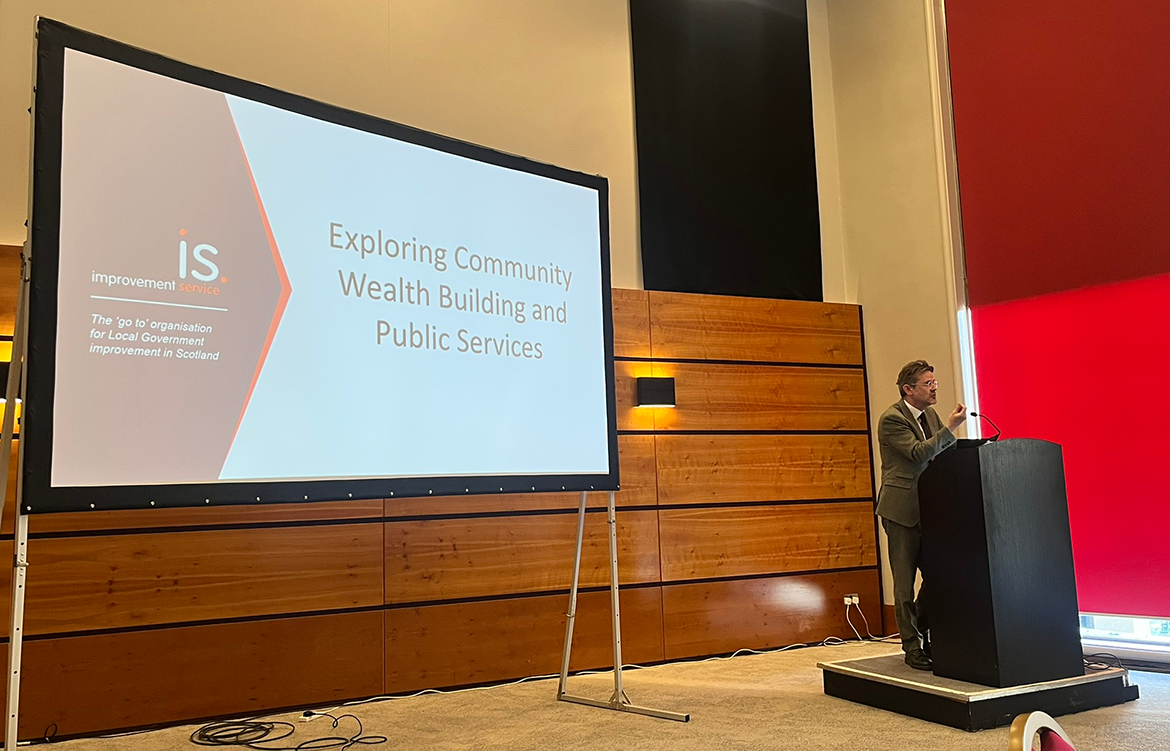The Improvement Service brought together policy makers, local authorities, community organisations, universities, and public health practitioners to explore community wealth building in Glasgow in April.
The event focused on how community wealth building (CWB) can support more inclusive local economies and enhance public services. Through examples and evidence from across the UK and Ireland, it explored how CWB can contribute to a rebalancing of economic power, reduce demand on services and improve overall wellbeing.
The key aims of the day were to:
- raise awareness and deepen understanding of the CWB approach
- highlight how CWB can help reduce pressure on public services
- connect practitioners to share learning and inspire further action across Scotland.
The day opened with a call to action from Neil McInroy of The Democracy Collaborative and EDAS, who framed CWB as a necessary shift from extractive economic models to local, democratic wealth retention. He emphasised that the public sector is a significant economic player, and that CWB can contribute to tackling the structural inequalities that increase demand for public services.

Other topics discussed were:
Shaping the future: the Community Wealth Building Bill
Senior representatives from the Scottish Government outlined the direction of the upcoming CWB Bill. They emphasised:
- ministerial obligations and statutory guidance
- place-based partnership duties (local or regional)
- requirements for public bodies to give “due regard” to CWB principles
The Bill aims to establish a legislative framework to ensure consistent implementation of CWB across Scotland, while recognising and supporting the progress already being made by local authorities.
Learning from the UK and Ireland
Naomi Mason (CLES) reinforced the message that rising GDP has not necessarily led to improved wellbeing, and that CWB is a people-centred alternative. Highlights from UK and Irish case studies included:
- Wigan’s Ethical Care Framework improving wages and care quality
- Wolverhampton’s solar farm powering NHS sites
- Hywel Dda Health Board’s local food procurement strategy
- Dublin’s social value clauses creating training-to-employment pathways
- Ireland’s SPARK climate co-op, linking environmental and social justice
Learning from the Preston Model
Matthew Brown, leader of Preston City Council, outlined the city’s remarkable transformation since 2011. Key initiatives included local pension fund investments, credit union expansion, formation of worker co-ops, and municipal ownership. The positive impacts experienced in Preston as a result of the implementation of CWB measures included:
- £200m increase in local procurement
- 11% rise in median wages
- 600 fewer mental health diagnoses
- Higher life satisfaction scores across the city
Spotlight on public services – thinking about impact across housing, work, and health
Housing – Orkney’s ethical brokerage
David Campbell shared how community-led housing efforts have delivered 50+ affordable homes by harnessing local partnerships, flexible funding, and community asset transfers. This ‘Orkney model’ exemplifies a needs-based approach to building housing.
Fair work – Living Wage Scotland
Rachel Morrison-McCormick highlighted that over one million Scots are currently living in poverty. With 3,800+ accredited employers, the Living Wage movement has raised the income of 69,000 workers and generated £600m in wages to low-paid workers.
Health – CWB as a public health tool
Sharon Currie, Public Health Scotland, outlined how economic inequality accounts for 40% of health outcomes. Emerging evidence supports CWB as an effective public health intervention. Read the Health Impact Assessment of Community Wealth Building.
Scottish case studies
- Fife’s Life Chances Model: supports people facing barriers to employment into ‘hard to fill’ vacancies within the council and partners. 77 placements so far, with “Life Chances Plus” on the way.
- Queen Margaret University: driving health innovation and regional economic development alongside East Lothian Council.
- City of Edinburgh Council: launching the Community-Led Improvement Programme (CLIP) to support tenant-led greenspace projects.
Key themes for action
Throughout the day, discussions surfaced five key themes that will shape the future of CWB:
1. Leadership and culture change
Strong leadership and a shared language are vital. CWB needs to be woven into all policies, with consistent definitions to foster shared understanding and buy-in across sectors.
2. Procurement
Unlocking CWB’s full potential requires procurement reform—supporting SMEs, co-ops, and local suppliers through simpler processes, capacity building, and clearer ‘best value’ criteria.
3. Partnerships and integration
Cross-sector partnerships (especially with third and private sectors) are essential. Linking CWB to CPPs, REPs, and national strategies (e.g. wellbeing economy, just transition) was widely identifies as essential
4. Funding and resourcing
Participants called for a national CWB funding map, easier access to community-level grants, and better support for third-sector delivery partners.
5. Measurement and reporting
Ideas ranged from flexible, localised metrics to a national menu of indicators. Consensus: outcome-based tracking is more useful than output counts.
Feedback, reflections and actions
Feedback from participants was overwhelmingly positive. When asked what the most valuable aspect to the day was, one attendee noted:
“The interesting and wide range of practical examples, from all across the UK. Some unique and innovative ways of supporting CWB, particularly through taking advantage of different funding opportunities.”
The energy in the room was inspiring but, moving forward, attention must turn to engaging those who were not in attendance. How can we leverage the momentum generated from this event to connect with new partners, particularly those who have yet to recognise the economic case for community wealth building?
Following on from the success of the event, the Improvement Service will:
- develop new case studies and training materials for elected members
- develop targeted support to local authorities not yet active in CWB
- continue convening the CWB Practitioners’ Network to support peer learning.
Want to get involved?
If you’re interested in learning more or getting involved in community wealth building through the Improvement Service, please get in touch: mia.duncan@improvementservice.org.uk